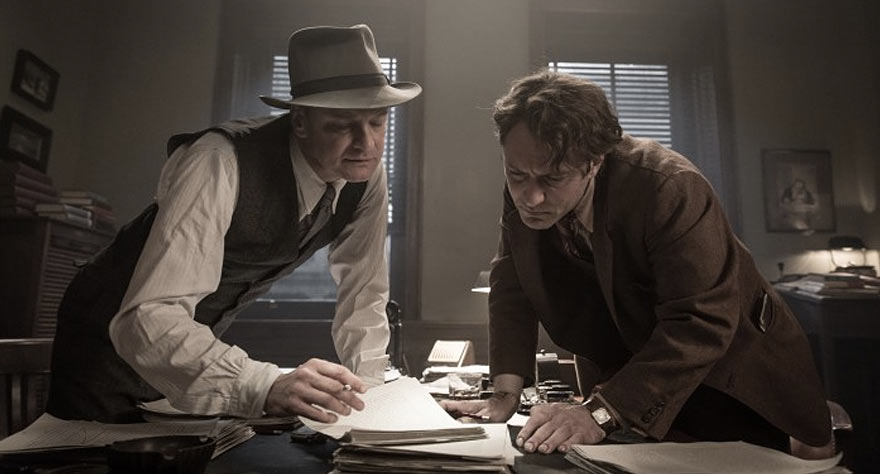
Colin Firth’s mighty sensitive performance as the heart of the film keeps the strength of friendship resonating throughout.

Colin Firth’s mighty sensitive performance as the heart of the film keeps the strength of friendship resonating throughout.
The subject of white male platonic bonding is as far from today’s film trends as you can possibly get. Even with its shortcomings, then, the heart of the matter in Michael Grandage’s star-studded Genius goes refreshingly against the grain. Add to that the look in the life of American author Thomas Wolfe (whom many, I suspect, readily forget in lieu of the William Faulkner’s and Ernest Hemingway’s of his time), and a shiny spotlight on the behind-closed-doors role of the editor, and there’s plenty to bite into here. Of course, with a cast featuring Colin Firth, Jude Law, Nicole Kidman, Laura Linney, and Guy Pearce, you walk in confident that if all else fails, at least the performances will keep you glued. And they do, but even beyond the curious choice of a dreary gray monochrome as the film’s primary palette, there’re a number of things that bog Genius down. The source is, as ever, the screenplay; in this case, John Logan’s adaption of A. Scott Berg’s biography Max Perkins: Editor of Genius. That said, Grandage takes the lion’s share of the blame for leaving the autopilot on his director’s chair and not trying something a little more enticing in way of presentation.
As it bizarrely shifts from black-and-white into colour, Genius opens with the famous editor of Charles Scribner’s Sons, Maxwell Perkins (Firth), receiving the bulbous first draft of what will eventually become “Look Homeward, Angel.” “Is it any good?” he asks, to which the deliveryman responds, “Good? No. But it’s unique.” That hooks him in. Of course, it turns out to be more than just good or unique, as we follow Max’ endearing routine of reading the manuscript until he reaches the end and gets that look—the title of Genius appearing to make sure there’s no confusion on our part either. During this routine, we get a passing glance at Max’s household, his wife Louise (Linney) and five daughters. Being surrounded by women all his life ends up playing a big part in the strong connection he develops with the erratic, enigmatic, and entirely insufferable Thomas Wolfe (Law).
Genius packs most of its meat into scenes featuring Wolfe and Perkins, as they bulldoze through Wolfe’s protracted manuscripts, first ‘Angel,’ and then—in a period of over 2 years!—Of Time and The River. Debating over how to cut down the chapter where his character falls in love with a blue-eyed girl is the film’s pinnacle; infinitely charming and richly insightful in the dynamic between ambitious author and economic editor. Threatening to steal the show from the two men, though, is Nicole Kidman, who pulls off a fiery and embittered turn as Aline Bernstein—a woman who left her husband and two children to be Wolfe’s full-time lover. Her whole life, it seems, revolves around this man who is too busy wrestling with his mountainous ego to return the love, and if the role weren’t so utterly thankless, Kidman surely would have soared even higher.
The two men’s flippant attitudes towards their respective other halves is never fully addressed (and, ironically enough, Max seems to care more about how much Mrs. Bernstein is suffering while completely ignoring his patronizing attitude toward his own wife). Among other issues that arise out of Logan’s screenplay are the peppered stings of obviousness throughout. The most articulate example comes when F. Scott Fitzgerald (Pearce) talks of “genius friendship,” and the double meaning of the title is neatly spoon-fed. There’s also Law’s exuberant performance as Wolfe. Showy, and something that must have been a lot of fun for the actor, but with just a bit too much pep in his step. This ultimately works against the film’s final moments.
It’s the prickly characterization of Thomas Wolfe that undoes Genius in the end. Whether by weighing the importance of the female characters (especially Kidman’s Aline, as Linney’s Louise is, sadly, much too minor to even mention) a bit more significantly, keeping Law’s performance in firmer check, or fine-tuning the screenplay so that the author’s moments of clarity have bigger impact; I feel Logan and Grandage could have handled it better. The fact that he’s not the main star leaves the film all the better for it. Firth’s mighty sensitive performance as the heart of the film keeps the strength of friendship resonating throughout, and is more than enough reason for a solid recommendation.